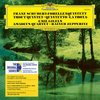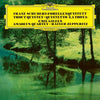



Franz Schubert - Piano Quintet in A Major, The Trout - Emil Gilels, Rainer Zepperitz, Amadeus Quartet
Franz Schubert - Piano Quintet in A Major, D. 667 ''Trout''
Emil Gilels – piano
Rainer Zepperitz - double bass
Norbert Brainin - violin
Peter Schidlof - viola
Martin Lovett - cello
1 LP, gatefold jacket
Original analog Master tape : YES
Heavy Press : 180g Virgin Vinyl
Record color : Black
Speed : 33RPM
Size : 12'’
Stereo
Studio
Record Press : Optimal (Germany)
Label : Deutsche Grammophon (The Original Source Series)
Original label : Deutsche Grammophon
Recorded in Turku, Finland, Konserthaus, August & September 1975
Engineered by Jobst Eberhardt
Produced by Günther Breest
Mixed by Rainer Maillard
Mastered and lacquer cut by Sidney C. Meyer at Emil Berliner Studios
Originally released in 1997 (as a CD)
Reissued in July 2024
Side A
- Allegro vivace
- Andante
Side B
- Scherzo (Presto)
- Thema - Andantino - Variazioni I-V - Alleg
- Finale (Allegro giusto)
Review:
"This convivial five-movement work by the 22-year‑old composer embodies many defining characteristics that contribute to its enduring popularity, but uppermost among these is the relentless joy at its core.
Schubert spent the summer of 1819 on holiday in Steyr in Austria with the baritone Johann Michael Vogl, his friend and a tireless promoter of his works. Vogl introduced him to Sylvester Paumgartner, a wealthy musical patron and amateur cellist. Paumgartner’s home included a well-stocked music library, a music room and a performing salon, and he commissioned Schubert to compose a piano quintet.
The work would incorporate Schubert’s Die Forelle, a song Paumgartner professed to love, and would utilise the unusual instrumentation of Hummel’s Piano Quintet for piano, violin, viola, cello and double bass, with which he was apparently also familiar.
Schubert was at his most prolific and beguiling in his songs. For the basis of a set of variations, the choice of Die Forelle seems to have been especially apposite, thanks to its rippling sextuplet accompaniment depicting darting fish and sparkling waters. The quintet resulting from Paumgartner’s challenge is an unrivalled masterpiece.
Schubert appears not to have completed the composition while he was in Steyr, but seemingly did so upon his return to Vienna during the autumn. There is no record of any complete performance during the composer’s lifetime either, and although it was first published in 1829, a year after his death, the original manuscript has not survived. The only remaining original source is a set of parts.
This 1975 recording is a glowing testament to an all-too-easily forgotten golden age of music-making; not a single note or phrase is allowed to pass by perfunctorily, with each lovingly constructed component contributing to a perfectly judged architectural whole. The Amadeus Quartet perform with customary panache, and Gilels’s sensitivity to every nuance justifies his status as one of the greatest pianists to have lived. Berlin Philharmonic bassist Rainer Zepperitz revels in this exalted company.” Classical Music Review by Leon Bosch
Ratings:
Discogs : 4.87 / 5


